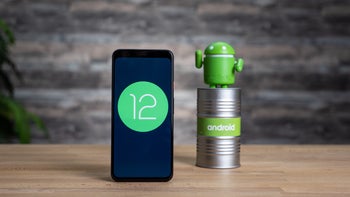Android vs iOS: The state of software support

Over the years, Android has been slowly creeping up to iOS in terms of overall software updates, trying to match its industry-leading five-year software update policy. While it's true that the differences between iPhones and Android-powered devices are too many and too diverse, we could all probably agree that at the end of the day, it all boils down to the amount of time your device is officially supported.
Years ago, none could match Apple's five-year software update policy. On Android, the norm was two years of updates and that's it. In mid-2021, no Android manufacturer offers five years of support on its devices, but we are getting closer and closer to that amount of time: the median software support is now upwards of three years, while select devices can enjoy even four years of continued support.
And thinks are definitely looking up for the land of Android. Rumor is that Google is planning to offer a total of five years of continued support for its upcoming Pixel 6 and Pixel 6 XL (Pro) devices, which are expected this fall. It could comprise of major software updates for three years followed by two additional years of security updates and patches, and while it's not as good as Apple's five-year complete software support, Google's move could signal a very major paradigm shift for Android as a whole.
With that in mind, let's see how the different manufacturers are doing in terms of software updates.
Samsung
In 2020, Samsung officially announced that all of its flagship phones from the Galaxy S10-series onward will be getting three years of major software updates. Later on, Samsung extended the software update courtesy to a whole bunch of tablets, foldable phones, and a bunch of Galaxy A series of phones. That's a commendable change that definitely affected millions of users worldwide given how popular Samsung's devices are.
Earlier in 2021, another beneficial change was announced. Over 130 models from the Galaxy S, Galaxy Note, Galaxy Z, Galaxy A, Galaxy XCover, and Galaxy Tab from 2019 onward were promised four years of continued security updates, which is doubling what Google is officially requiring from Android manufacturers. This means that with the earlier change in mind, you can expect your Galaxy flagship to get three years of major updates and an additional year of vital security support.
Even better, enterprise editions of the Galaxy S20, Galaxy S20+, Galaxy S20 Ultra, Galaxy Note 20, Galaxy Note 20 Ultra, Galaxy XCover 5, and the Galaxy Tab Active 3 have been recently announced with five years of continued software support. Surely, regular folks wouldn't be able to benefit from this enterprise-only boon.
We've reached to Samsung to elaborate on any future plans it might have on expanding its software update policy, and we will update this piece as soon as we receive an official statement.
Google has always required Android manufacturers to provide at least two years of software and security updates. However, its Pixel phones enjoy a healthy three-year support, including both major Android versions and timely security updates.
Rumor is Google could one-up itself and offer five years of software support starting with its upcomingPixel 6 and Pixel 6 XL phones, which will not only match what Apple is offering, but will also emit a rather strong signal throughout the Android ecosystem. Hopefully, the rest of the manufacturers residing in the Android space will be striving to match this yet unofficial update policy.
What could further tip the scales in Google, and generally, Android's favor in the never-ending battle against iOS is the fact that Pixel phones receive a steady stream of monthly security patches, whereas Apple doesn't have a set schedule for steady releases of iOS updates and only does so on a random basis, or in the worst case scenario, when a major security flaw in iOS gets discovered. This could be the straw that breaks the camel's back, but in a positive way, of course.
We've reached to Google to elaborate on any future plans it might have on expanding its software update policy, and we will update this piece as soon as we receive an official statement.
OnePlus
OnePlus has been slowly inching toward a standardized three-year major update and four years of security update policy as well. After the recent merger with sister company Oppo, OnePlus seems to have a renewed fervor for continued device support. The current device lineups are all benefiting, it would seem, but many older flagships will also be affected by the backdated change.
Here's what OnePlus officially said about its software update policy:
"We actually recently updated our software maintenance schedule so we have are happy to announce these updates for our open market smartphones. Flagship product line (including T / R): The OnePlus 8 series and newer devices will receive 3 major Android updates and 4 years of security updates. Nord / Nord CE: The first OnePlus Nord and newer Nord / Nord CE devices will receive 2 major Android updates and 3 years of security updates. Nord N series: Starting from N10 and N100, all N series devices will receive 1 major Android update and 3 years of security updates."
This policy will certainly apply to the company's upcoming devices, with the next one being the OnePlus 9T in the fall, though it's unclear how the merger with Oppo will affect any subsequent device lineups.
Motorola
Motorola has had a so-so relationship with steady software updates. The company hasn't committed to anything beyond the standard Android support window, which is regrettable. The more memorable of you might also remember that the company tried to get away with only supporting the $1000 Moto Edge for just one year, but public pressure forced them to reverse their decision.
Here's Motorola's current statement about its software support: "Motorola is committed to bringing intuitive software experiences to our consumers. There are no clunky software skins, no duplicate apps. When it comes to software upgrades, we’re constantly working with partners and our internal teams to ensure consumers have the latest and best technology on their Motorola devices.
Motorola is also committed to regular and timely security upgrades as recommended by Google/Android. While phones cannot be upgraded indefinitely, we provide security upgrades within the industry standard on both our regular and our Android One devices.
Additionally, more and more, essential apps can be updated via the Playstore. Google and Motorola intend to keep expanding the apps that are Playstore updatable, which allows us to update essential apps like camera, UI, Moto Experiences, and messaging apps much quicker than a yearly OS upgrade."
Interestingly, Sony doesn't have an easily-accessible official software update policy for its flagship, and we have to rely on local branches to spill the beans about the often disappointing support policy. Take the $1,300 Sony Xperia 1 III as the perfect example to that: according to the Dutch arm of Sony, the latest flagship will seemingly receive only one major Android update to Android 12.
Motorola is also committed to regular and timely security upgrades as recommended by Google/Android. While phones cannot be upgraded indefinitely, we provide security upgrades within the industry standard on both our regular and our Android One devices.
Additionally, more and more, essential apps can be updated via the Playstore. Google and Motorola intend to keep expanding the apps that are Playstore updatable, which allows us to update essential apps like camera, UI, Moto Experiences, and messaging apps much quicker than a yearly OS upgrade."
Sony
Interestingly, Sony doesn't have an easily-accessible official software update policy for its flagship, and we have to rely on local branches to spill the beans about the often disappointing support policy. Take the $1,300 Sony Xperia 1 III as the perfect example to that: according to the Dutch arm of Sony, the latest flagship will seemingly receive only one major Android update to Android 12.
Certainly, two years of security patches are a given, but Sony's overall support policy doesn't exactly shine when you compare it with the competition. There have been rumors about an extended software support policy of up to three years for phones released after 2020, but the recent dire news about Xperia 1 III doesn't inspire confidence.
Xiaomi
Xiaomi is a bit different as it treats its phones to not only major Android updates, but also pushes updates to the MIUI software of its devices. Usually, devices receive at least one major Android version upgrade, but their MIUI skins are supported for up to four years. That's not that bad as many features of major new Android versions are emulated and integrated into MIUI, thus arriving to older devices, too.
We reached out to Xiaomi to elaborate on its current and future plans for extended software support on its devices, but the company literally had nothing to say: "No updates on this for now, but it is something we’re looking into. Will loop you in on future info."
Huawei
Huawei, as many of you might imagine, is an interesting case, due to the US ban that rendered it impossible to do any business with any organization that does business in the US. Despite that, Huawei can still use AOSP in any way it likes, though Google's service and essential apps can't be found on any Huawei phone released in the past year and a half. That's why software updates apply on per-device case.
Here's what the company had to say on the matter: "Privacy protection and security have always been Huawei’s top priority, and Huawei has been innovating to protect users’ privacy and security. We rigorously adhere to foundational principles for data privacy during the entire product design and development process. We continuously provide security updates to our users, when necessary and will continue to offer them timely technical support."










Things that are NOT allowed: